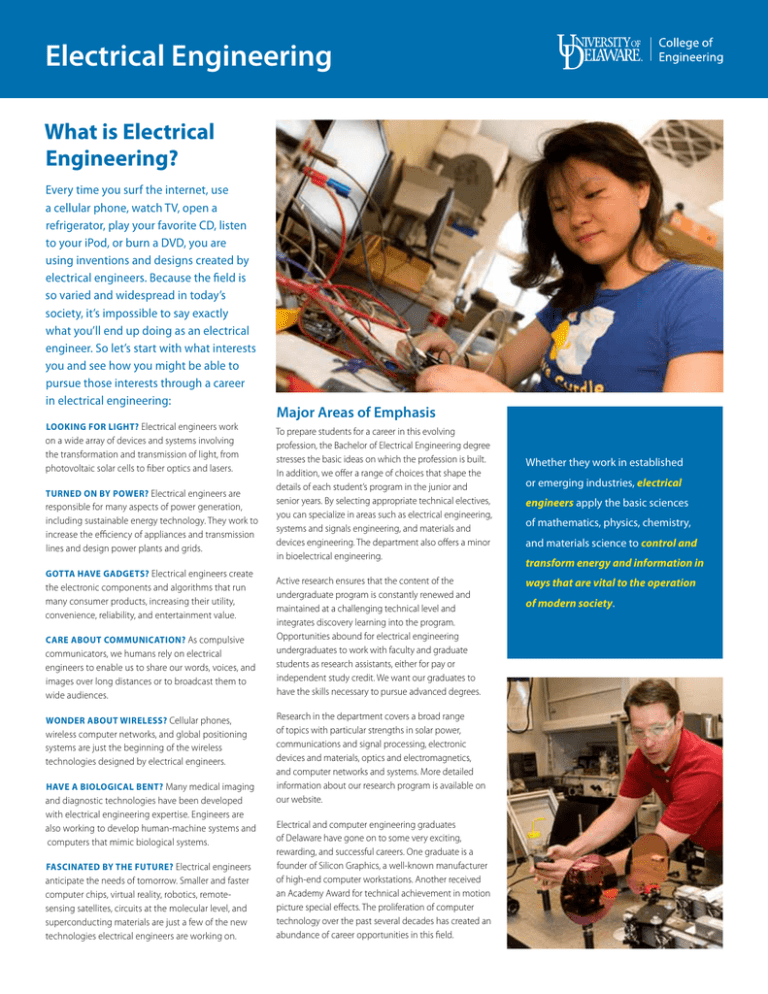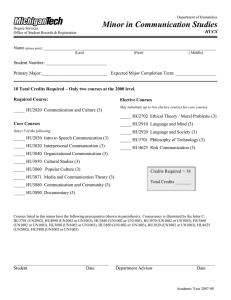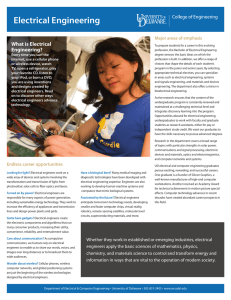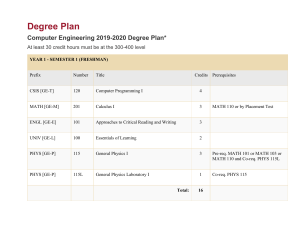Electrical Engineering - College of Engineering
advertisement

Electrical Engineering What is Electrical Engineering? Every time you surf the internet, use a cellular phone, watch TV, open a refrigerator, play your favorite CD, listen to your iPod, or burn a DVD, you are using inventions and designs created by electrical engineers. Because the field is so varied and widespread in today’s society, it’s impossible to say exactly what you’ll end up doing as an electrical engineer. So let’s start with what interests you and see how you might be able to pursue those interests through a career in electrical engineering: LOOKING FOR LIGHT? Electrical engineers work on a wide array of devices and systems involving the transformation and transmission of light, from photovoltaic solar cells to fiber optics and lasers. TURNED ON BY POWER? Electrical engineers are responsible for many aspects of power generation, including sustainable energy technology. They work to increase the efficiency of appliances and transmission lines and design power plants and grids. GOTTA HAVE GADGETS? Electrical engineers create the electronic components and algorithms that run many consumer products, increasing their utility, convenience, reliability, and entertainment value. CARE ABOUT COMMUNICATION? As compulsive communicators, we humans rely on electrical engineers to enable us to share our words, voices, and images over long distances or to broadcast them to wide audiences. WONDER ABOUT WIRELESS? Cellular phones, wireless computer networks, and global positioning systems are just the beginning of the wireless technologies designed by electrical engineers. HAVE A BIOLOGICAL BENT? Many medical imaging and diagnostic technologies have been developed with electrical engineering expertise. Engineers are also working to develop human-machine systems and computers that mimic biological systems. FASCINATED BY THE FUTURE? Electrical engineers anticipate the needs of tomorrow. Smaller and faster computer chips, virtual reality, robotics, remotesensing satellites, circuits at the molecular level, and superconducting materials are just a few of the new technologies electrical engineers are working on. Major Areas of Emphasis To prepare students for a career in this evolving profession, the Bachelor of Electrical Engineering degree stresses the basic ideas on which the profession is built. In addition, we offer a range of choices that shape the details of each student’s program in the junior and senior years. By selecting appropriate technical electives, you can specialize in areas such as electrical engineering, systems and signals engineering, and materials and devices engineering. The department also offers a minor in bioelectrical engineering. Active research ensures that the content of the undergraduate program is constantly renewed and maintained at a challenging technical level and integrates discovery learning into the program. Opportunities abound for electrical engineering undergraduates to work with faculty and graduate students as research assistants, either for pay or independent study credit. We want our graduates to have the skills necessary to pursue advanced degrees. Research in the department covers a broad range of topics with particular strengths in solar power, communications and signal processing, electronic devices and materials, optics and electromagnetics, and computer networks and systems. More detailed information about our research program is available on our website. Electrical and computer engineering graduates of Delaware have gone on to some very exciting, rewarding, and successful careers. One graduate is a founder of Silicon Graphics, a well-known manufacturer of high-end computer workstations. Another received an Academy Award for technical achievement in motion picture special effects. The proliferation of computer technology over the past several decades has created an abundance of career opportunities in this field. Whether they work in established or emerging industries, electrical engineers apply the basic sciences of mathematics, physics, chemistry, and materials science to control and transform energy and information in ways that are vital to the operation of modern society. Additional Opportunities for Study Electrical Engineering Curriculum Exploring the humanities and social sciences through the breadth requirements All engineering curricula have at least 21 credits set aside for breadth requirement courses, 18 credits of which are chosen from an extensive list of humanities and social science options. The remaining 3 credits are usually satisfied by chemistry, math, or physics courses all engineering students are required to take. The University requires that 3 credits of breadth requirement coursework satisfy the Multicultural Requirement and the College requires that 6 credits of breadth requirement coursework be above the introductory level. Students entering with Advanced Placement (AP) credit may have already completed several of these courses. Fall First Year Course # After Graduation On average, 70–80% of graduates with a Bachelor of Electrical Engineering degree choose employment in private industry, government laboratories and agencies, and non-profit research centers. Approximately 15–20% of electrical engineering graduates choose to continue their education toward a master’s or Ph.D. degree, and some graduates will opt to attend medical, law, or business school. Students who earn advanced degrees in engineering usually pursue a career in advanced research or as a faculty member in a college of engineering. First Year Course Description Credits Course # Course Description Credits EGGG 101 Introduction to Engineering (FYE) 2 CISC 181 Introduction to Computer Science 3 CHEM 103 General Chemistry I 4 PHYS 207 Fundamentals of Physics I 4 MATH 241 Analytic Geometry & Calculus A 4 MATH 242 Analytic Geometry & Calculus B 4 CISC 106 General Computer Science for Engineers 3 CPEG 202 Introduction to Digital Systems 3 Critical Reading and Writing 3 Breadth Requirement Elective 1* 3 ENGL 110 Exploring other subjects through minors A minor is a small set of courses in a particular subject area that is different from a student’s major. Minors normally require five to seven courses to be completed in their subject areas. Because students may doublecount courses for credit against both majors and minors, they can often complete a minor by doing no additional work if they choose their elective courses carefully. About half of all engineering students have at least one minor, and many have two or three. Some of the most popular minors for electrical engineering majors include bioelectrical engineering, computer science, economics, foreign languages, materials science, mathematics, nanoscale materials, physics, and sustainable energy technology. Spring 16 Second Year Course # 17 Second Year Course Description Credits Course # Course Description Credits ELEG 205 Analog Circuits I 4 CISC 220 Data Structures 3 CPEG 222 Microprocessor Systems 4 ELEG 305 Signals & Systems 3 MATH 243 Analytic Geometry & Calculus C 4 ELEG 309 Electronic Circuit Analysis I 4 PHYS 208 4 MATH 341 Differential Equations w/ Linear Algebra I 3 Breadth Requirement Elective 2 3 Fundamentals of Physics II 16 16 Third Year Course # Third Year Course Description Credits Course # Course Description Credits ELEG 320 Field Theory I 4 ELEG 310 Random Signals and Noise 3 ELEG 340 Solid State Electronics 3 ELEG Foundation Elective I 3 3 ELEG Foundation Elective 2 3 Technical Elective I 3 Breadth Requirement Elective 4 3 MATH 342 Differential Equations w/Linear Algebra II Written Communication Elective 3 Breadth Requirement Elective 3 3 16 15 Fourth Year Course # Fourth Year Course Description Credits Course # Course Description Credits ELEG Foundation Elective 3 3 ELEG Design Requirement (DLE) 4 ELEG Foundation Elective 4 3 ELEG 491 Ethics and Impacts of Engineering 2 ELEG/ CPEG 3xx Technical Elective 3 ELEG/ CPEG 4xx Technical Elective 1 3 Technical Elective 2 3 3 3 ELEG/ CPEG 4xx Technical Elective 2 Breadth Requirement Elective 5 15 Breadth Requirement Elective 6 Total Credit Hours: 126 * A list of Breadth Requirement courses is available at: www.engr.udel.edu/advise/undergrad_programs.html Department of Electrical & Computer Engineering • University of Delaware • 302-831-2405 • www.ee.udel.edu 3 15




